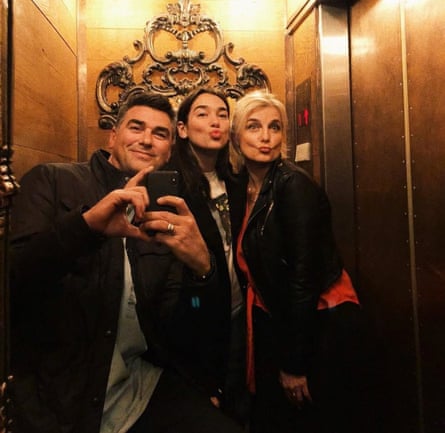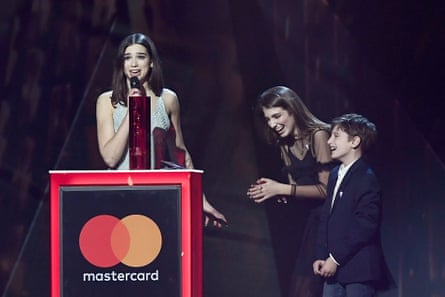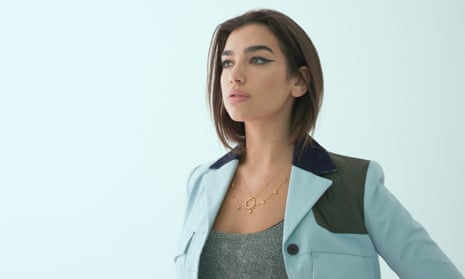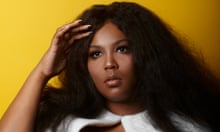There are plenty of reasons to be startled by the young musician Dua Lipa. Her cynical, defiantly un-sunny pop anthem New Rules was an improbable song-of-the-summer last July. Streamed online more than 1bn times since, it has helped establish this 22-year-old Londoner as pop’s beach-storming new conquistador – a winner of two Brit awards in February, and the first female artist to be nominated for five. Lipa has an unusual name and history (she comes from a family of Kosovan academics, parted in the 1990s by war), a room-stilling presence (she stands 6ft-plus in heels), and a talent for hanging together pop-music contradictions, specialising in floor-filling bangers that are somehow both jaded and buoyant, universal and intimate. She’s interesting in a number of ways, all of which I want to explore when I meet her one morning in London, towards the end of her Observer cover shoot. Before anything else, though, we discuss her hands.
Specifically Lipa’s palms, which are as tough and as work-worn as a lumberjack’s. It’s as if Lipa has spent the week up to now baking bricks, or fighting in a cage. Laughing about it, sighing, Lipa passes her hands around so that everyone in the studio can have a feel. She blames her personal trainer. “We lift a lot of weights,” she says. “We box.” And the crowds on her recent world tour, Lipa points out, wouldn’t just rouse themselves. “I feel like I’ve spent about a year clapping these hands together and shouting: ‘Come on!’”
Lipa is bright, good fun, not easily cowed. She asks to feel my palms; and after briefly investigating these pearly idler’s mitts she plants on me a brilliantly sceptical stare, as if to ask: have you ever done a hard day’s work? She’s proud of her work ethic. Last week she was gigging in Australia, where some nights, to the squealy delight of her fans, she not only sang but manned the arena merch stands. “It’s a 24-hour job,” she tells me. “And at this point I want to be able to say yes to everything. Every tour, every show, every shoot, every whatever.”
We’re in a warehouse in east London, one of those vast places that’s been whitewashed and stud-walled to make it into a multipurpose space, part studio, part gallery. Now that the glowering and vogueing of the photoshoot is over, Lipa puts on patterned jeans and a loose cream jumper, inside the collar of which she tucks a fistful of her dark shoulder-length hair. She needs a tea and a sit, so together we set off through the warehouse corridors to find somewhere. There’s a small glass-walled room abutting the gallery, and as both are deserted it seems a sensible place to put ourselves. Then midday rolls by, and people wander in off the street to admire the art. Some glance through at Lipa, out of reach and out of earshot beyond a wall of glass.
It strikes Lipa as she sips her tea that this all amounts to a pretty good analogy for a pop career. Sitting – exposed, apart and a touch ridiculous – in a giant transparent box.
“You want to be as honest as possible in the music you make,” she says, thinking not so much of her smash single New Rules, which Lipa did not write herself, as of songs such as Blow Your Mind (Mwah) and IDGAF, Lipa’s blunt, sweary postscripts on unhappy love affairs. She continues: “But then there’s the other side of it, when you do want a bit of a personal life, and you get upset that you’ve opened yourself up so much.” She shrugs inside the cream jumper, which unlooses some of her hair. “I guess it comes with the territory – a figuring-out of the right balance, how to be really content, y’know, in this see-through box I’m now living in.”
As I said before, she isn’t easily cowed. Earlier this year Lipa read a comment by one of her fans online and took a moment to respond to it. This was as ephemeral as any social media moment, a come-and-go thing that in the end amounted to a few dozen characters on Twitter. But when I read about the incident (which the tabloids wrote up as a minor scandal) I was intrigued, because it seemed a rare example of a pop star breaking character – to remind the public just how silly and how unreal this whole pop game is. Lipa had just separated from her boyfriend, Paul Klein, of the US rock band LANY; and now there was gossipy speculation she was back in touch with an ex, a chef called Isaac Carew. One fan thought of the lyrics to Lipa’s New Rules, in which the dos and don’ts of a break-up were carefully itemised (“One, don’t pick up the phone…”).
“Sis,” this fan tweeted at Lipa. “You broke the new rules.”
“Sis,” Lipa wrote back a minute later. It was the middle of the night. “Get a grip.”
Over tea with me she chuckles awkwardly about this. “People have kind of gotten the idea that the song isn’t about someone who’s [romantically] toxic to you, it’s about any male whatsoever in your life. I’ve seen memes that say: ‘Well, I haven’t picked up the phone to my dad or my brothers in months!’ And I think to myself: ‘I’m so sorry. I’ve created monsters.’”
Pop should be taken lightly, Lipa believes. “It has to be fun. You’ve got to enjoy it. You can’t get upset about every little thing.” Music after all is the escape – the real world has plenty of methods for upsetting us already.
And so we discuss geopolitics, and Lipa’s family history. She comes from a large family of ethnic Albanians, to whom “so much has happened”, she says, “in my grandparents’ lives, and my parents’ lives… When you try to come to it and grasp everything there, it’s a lot.” She does her best to boil down their complicated story.
Her mother, Anesa, was born to a Kosovan father and a Bosnian mother. In the 90s, war came first to Bosnia, where Anesa’s mother lived, and then to Kosovo, where by now Anesa was living with her fiance, Dukagjin Lipa. Dukagjin was the son of a well-known historian, Seit Lipa, who at that time was the head of the Kosovo Institute of History. When conflict began to brew in Kosovo, Seit’s career abruptly ended. As Lipa tells it: “Once the Serbians came in, they wanted a lot of the historians to rewrite the history of Kosovo. To change it – that Kosovo was always part of Serbia and never part of Yugoslavia. And my grandfather was one of those people who wouldn’t, so he lost his job, because he didn’t want to write a history that he didn’t believe to be true.”
In 1992, Dukagjin and Anesa sought refuge in London, while their parents stayed behind in Kosovo and Bosnia. Seit Lipa died in 1999, the year that the Kosovo war ended. “He had a heart attack. And because the borders were closed, my father couldn’t go back to see him.”

Lipa was born in north-west London in 1995. “I’ve seen my parents work every day of my life,” she says. In Kosovo her father was training to be a dentist, her mother to be a lawyer. Sudden flight to London threw all this over, and for a long time Lipa’s parents worked as waiters in cafes and bars. In the evenings, her father took business courses. Her mother retrained in travel and tourism. “While I was going to school they were going to school.”
Flight and sanctuary form the backbone of her family story, and I ask Lipa what she has made of recent political flailings – specifically President Trump’s crowing about his border wall, and before that the extremist Brexiters with their scare-stories about refugees. Lipa says that coming from a background such as hers, “you understand something on a personal level. That no refugee leaves their country without having to.” As for Brexit itself, “I see how important it is for Kosovo, for Kosovans, to be a part of the EU, what it means for them to be a part of something like that. So it’s heartbreaking.” On Trump she takes the long view – very much the historian’s granddaughter. “Later down the line I think we’ll be able to see very clearly, when we put someone like Trump in power, what went wrong. And the hope is we’ll learn from it.”
We talk about that amazing name – her grandmother’s suggestion, she says, as dua is the Albanian word for love. “Now I’m proud of it. Now I am. But when I was growing up all I wanted was to be called Hannah, Sarah, Ella… anything normal. Because with Dua you had to explain: I’m from Kosovo.” And this in turn made a lot of people adopt a particular expression – intrigued, sad. It was well-meant sympathy, but brutal war isn’t the first thing any kid wants other people to think about when they’re saying hello.
Lipa sometimes uploads old family photos to her Instagram, and not a few of them show her parents when they first arrived in London. Yikes! There’s a wedding photo that shows Anesa wearing a headdress of flowers and Dukagjin, who in Kosovo had played in a guitar band, with long rock-star hair. This pair absolutely smouldered. Lipa recalls: “Boys at school would say: ‘Your mum’s really hot.’ And the girls would say: ‘Your dad’s so fit.’ Now I find it funny, but as a kid you didn’t want to be different. It made me blush.”
From the available evidence on social media, her parents continue to smoulder. They are great senders of heart emojis, patently still besotted with each other. To be the child of a Really Good Couple, I start to say to Lipa… That can have its own difficulties. Especially if it puts a fixed idea in your head of what love should look like.
Lipa says: “Tell me about it. You have such high expectations. My mum married the first man she fell in love with – first boyfriend, first everything. It does kind of paint this ideal love story in your head.” At some point, she says, she decided to opt out of the family-approved “timeline of life, which goes birth, school, university, find a job, fall in love, get married, have kids. I feel like [for my parents] you turned 28, and people would look at you: ‘Why aren’t you in a relationship yet? Why haven’t you got kids? What’s wrong with you?’ Whereas now – it’s seen as being OK to be selfish. It’s OK to want to better yourself first, before you decide to bring other people into the world.”
Lipa was 11 when her parents sat her down at the kitchen table with big news. Dukagjin had graduated from his studies and been offered a job in the Kosovan capital, Pristina. Lipa was at the end of primary school. “My best friends were all going to different schools. And I told them, ‘Um, I’m going to Kosovo.’”
How did you feel?

“I was excited. We always spoke Albanian at home. I had my cousins in Kosovo that I’d never met.”
And when you got there?
“It was absolutely mortifying. Going into a classroom… I remember my first science lesson. They were so far ahead, in terms of mathematics and science. I got such bad grades, especially in the first six months. I could speak the language, but I couldn’t read or write in it.”
There was a lot she loved about Pristina. Living there helped Lipa understand she wasn’t just a Londoner, as she’d always thought – that instead she “came from two places”. In musical terms, it was in Pristina that she first got into American hip-hop. Snoop Dogg and Method Man toured through, and these were Lipa’s first gigs. The experience planted in her a love for rap that sat alongside her established obsession with bright, brash pop: Pink, Nelly Furtado, Katy Perry. Lipa knew she could sing. Sometimes, in private, she tried mashing together the two influences, putting a deep, drawled, sung-rap spin on her bedroom renditions of Christina Aguilera. She hoped for some formal training and when Lipa was about 14 she sat down with her parents for another kitchen-table conference.
Lipa told them: “I wanna go back. I wanna go to Sylvia Young [theatre school] on Saturdays. I wanna be in the place where things are happening.” It has become a part of her approved sleeve-notes history, that the reason Lipa begged to return to London was because she was pining for music stardom. Hearing this, I always worried it was a bit neat – publicist-penned, maybe. Because what teenager persuades their parents to let them move 1,500 miles on the wild, one-in-a-million chance of them making it as a pop star?
Me, says Lipa. “I didn’t think I’d be able to do this on a global scale, living in Kosovo.”
You weren’t telling yourself that at 14…
“I was. Absolutely.”
OK. But you weren’t telling your parents that at 14…
Lipa smiles: yes and no. She came up with “a trick”, she says, selling her parents on the idea that her main goal was to go to a good, British university. “I said: ‘To do that I’ll need to do my GCSEs and A-levels in English.’” It worked, and they agreed. Back in London, Lipa was looked after by friends of her parents. She did enrol at Sylvia Young on weekends, and began recording demos that she uploaded to YouTube and SoundCloud.
For the most part, Lipa says, she was well behaved in this minimally chaperoned period; only one near arrest, when she and some mates were told off by a policeman for throwing bubble-bath out of a window. “Honestly? I was a really good kid. I knew how terrified my parents were to let me do my thing. And I didn’t want to let them down – partly because I didn’t want them to move to London to look after me. My little sister and brother [Rina and Gjin, now 17 and 12] were just settling in school in Pristina. I didn’t want to separate the family. And I felt confident. Self-assured. I had a good relationship with my parents. They trusted me.”
As well as trying to be noticed as a musician, Lipa started a fashion blog. Sweetly titled – “Dua Daily” – this started as a sixth-former’s hobby and was maintained pretty thoroughly for two or three years at the end of her teens. Parts still exist online (Lipa’s voice squeaks when I mention it: “Is it online somewhere? That’s so funny”) and as a document it’s intriguing, charting a young woman’s evolution from wide-eyed kid to a professional London scenester, musing on “how important networking is”. We see her try some modelling, try some acting (at one point in an X Factor ad). For the most part she was forthcoming during this period. Networking, and networking some more, always pushing on anybody in music the links to her demos.

Eventually Ben Mawson, Lana Del Rey’s manager, had a listen. He signed Lipa, and started arranging long, immersive studio sessions with different collaborators. (The blog: “I am now currently on a gap year and plan to focus full time on my extra curricular activities. And by that I mean music!”) Client and manager were waiting to hear something that excited them. And the best stuff, tonally, seemed to happen when Lipa’s two preferred genres – moody rap and catchy bubblegum – came crunching together. New Rules was actually written for and rejected by a number of other artists, including the girl band Little Mix. When Lipa tried the track she infused it with something new, a battle-weary languor that made it a timely anthem of millennial ennui. One and a half billion clicks later New Rules remains her calling card, her name-maker. At the Brits in February her performance of the song was the evening’s highlight.
She had been nominated in five categories on the night. New Rules was up for best single, and her million-selling debut album, Dua Lipa, was up for best album. In the end she won twice, as best female solo artist and British breakthrough act, which meant two trips to stage and two very different speeches.
The first was political. “Here’s to more women on these stages,” Lipa said, “more women winning awards, and more women taking over the world.” Thinking back on this, Lipa tells me it hadn’t gone unnoticed by her that she was the only woman nominated in a number of those other, nominally multi-gender categories… “I felt it was really important to touch on the fact that I’ve always been inspired by women and they were the reason I was stood on that stage.”
Her second speech of the night was softer, wispier – a “chase your dreams/magic is real” bromide that I now find hard to square with the punchy realist I’ve been taking to all morning. Lipa, not so long ago, was able to step out of the pop bubble and tell a fan: get a grip. Can she really believe in all that dream-chasey, magic-can-happen stuff?
Lipa listens to this and says sure. But what she learned from her family’s experience was that you keep going, you keep working, you try to better your chances of better luck. “A big part of who I am,” she says, “has been watching my parents learn to adapt in different places, in different circumstances… And my dad would always tell me: ‘You have to work really, really hard, just to have a tiny bit of luck.’ So to answer your question, I do believe in the romantic side of it. And I believe in the hard graft, too.”
She opens her hands: the lumberjack palms.
“For me, growing up, doing music, watching pop stars on TV – that felt as crazy as cartoons. Totally unbelievable. Not real. What I’ve learned from my parents is this: everything comes from hard work. And then, maybe, things align.”










Comments (…)
Sign in or create your Guardian account to join the discussion